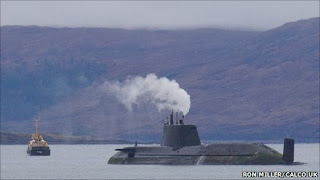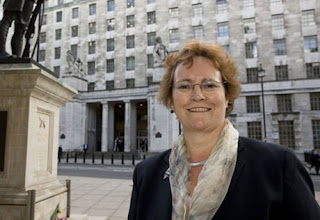
By George Monbiot. Published in the Guardian 23rd November 2010
You’ve been told that nothing is sacred; that no state spending is safe from being cut or eroded through inflation. You’ve been misled. As the new public spending data released by the government show, a £267bn bill has been both ring-fenced and index-linked. This sum, spread over 50 years or so, guarantees the welfare not of state pensioners or children or the unemployed, but of a different class of customer. To make way, everything else must be cut, further and faster than it would otherwise have been.
This is the money the state now owes to private corporations: the banks, construction and service companies which built infrastructure under the private finance initiative. In September 1997 the Labour government gave companies a legal guarantee that their payments would never be cut. Whenever there was a conflict between the needs of patients or pupils and PFI payments, it would thenceforth be resolved in favour of the consortia. The NHS now owes private companies £50bn for infrastructure that cost only £11bn to build, plus £15bn for maintenance charges.
PFI contracts typically last for 25 or 30 years; in one case (Norfolk and Norwich University Hospitals) for 60 years. In 1997 the British Medical Association warned that “the NHS could find itself with a facility which is obsolete in 10 or 20 years’ time, but for which it will still have to pay for 30 years or more.” No one’s celebrating being proved right.
This summer Edinburgh Royal Infirmary, thanks to the extortionate terms of its PFI contract, found itself with a shortfall of £70m. Under other circumstances it would suspend maintenance work and cut ancillary services until the crisis had passed. But its contract demands that it does the opposite: it must protect non-clinical services by cutting doctors, nurses and beds.
If a hospital no longer requires the services it contracted to buy, tough. If clinical needs or local demographics change, tough. Where hospitals can’t pay the massive penalty clauses said to lurk in the agreements, the NHS must be re-shaped around contractual, not clinical, needs.
The cost and inflexibility of PFI is an outrage, a racket, the legacy of 13 years of New Labour appeasement, triangulation and false accounting. At first sight, it looks as if nothing can be done: contracts are contracts. What I’m about to propose is a wild shot, but I hope it deserves, at least, to be discussed. I contend that the money we owe to the PFI consortia should be considered odious debt.
Odious debt is a legal term usually applied to the endowments of dictators in the developing world. It means debt incurred without the consent of the people and against the national interest. While the concept is not accepted by all legal scholars, it has some traction. In 2008 Ecuador refused to pay debts which, it argued, had been illegitimately acquired by previous governments. I believe it applies to at least some of our PFI liabilities.
PFI was a Tory invention but became a Labour doctrine. The 1997 Labour manifesto announced that the party would “reinvigorate the Private Finance Initiative”. But it was vague about the detail. Labour front-benchers had announced that some areas of public provision were off-limits. For example, John Prescott pledged that “Labour will take back private prisons into public ownership”. Jack Straw promised to “bring these prisons into proper public control and run them directly as public services.” But within two months of taking office, Straw had renewed one private prison contract and announced two new ones. There was no democratic mandate for this policy, which appears to have arisen from secret talks with companies.
Secrecy surrounded the whole scheme. To this day, PFI contracts remain commercially confidential. You can’t read them; MPs can’t read them. We don’t know what we are being stung for or whether the costs are justified. But there are some powerful clues.
Blair’s administration gave public bodies no choice: if they wanted new projects, they had to use the private finance initiative. In some cases private companies weren’t interested, so the schemes had to be reverse-engineered to attract them. In Coventry, for example, NHS bosses originally sought £30m of public money to refurbish the city’s two hospitals. When the government told them it was “PFI or bust”, the refurbishment plan was dropped in favour of a scheme to knock down both hospitals and build a new one – with fewer beds and doctors and nurses – at an eventual, corporate-friendly cost of £410m. A report commissioned by the local health authority found that the scheme had been “progressively tailored to fit the needs of private investors”(15).To get their new buildings or services, public bodies had to show that PFI was cheaper than public procurement. The system was rigged to make this easy. They could choose their own value for “optimism bias” in public procurement, which means the amount by which they guessed that a public project might overrun its budget. But, by official decree, optimism bias was deemed not to exist in private procurement.
They could also attach whatever price they wanted to the risk ostensibly being transferred to the private sector. A paper published in the British Medical Journal shows that, before risk transfer was costed, the hospital schemes it studied would have been built more cheaply with public money. After the risk was estimated, they all tipped the other way; in some cases by less than 0.1%.
These valuation exercises were notional anyway, because as soon as a preferred bidder for the contract had been chosen, the agreed prices were junked. The winning consortium had the public authority over a barrel, and could renegotiate at leisure. Desperate public bodies were gulled and outmanoeuvred with the blessing of central government, which sought only to keep the corporations off its back and the liabilities off its balance sheets. Was this a legitimate means of loading our schools and hospitals with debt? I don’t think so.
I know that the chances of getting any of this debt recognised as odious, especially by the current government, are small to say the least. But where else do we go with this? I’ve been writing about inflexible PFI contracts since 1998. I’ve wasted months on this mission, trying to understand and explain the most complex issue in public life. For all the good it’s done, I might as well have gone fishing.
Now I see corporations squatting like great cuckoos on our public services, while officials pour the money which should have been spent on nurses and teachers into their widening bills. Yes, I’m bitter. Yes, I’m clutching at straws. But have you got a better idea?
www.monbiot.com
 A new Conservative peer has claimed that Coalition changes to the welfare system will encourage “breeding” among those on benefits.
A new Conservative peer has claimed that Coalition changes to the welfare system will encourage “breeding” among those on benefits.



















